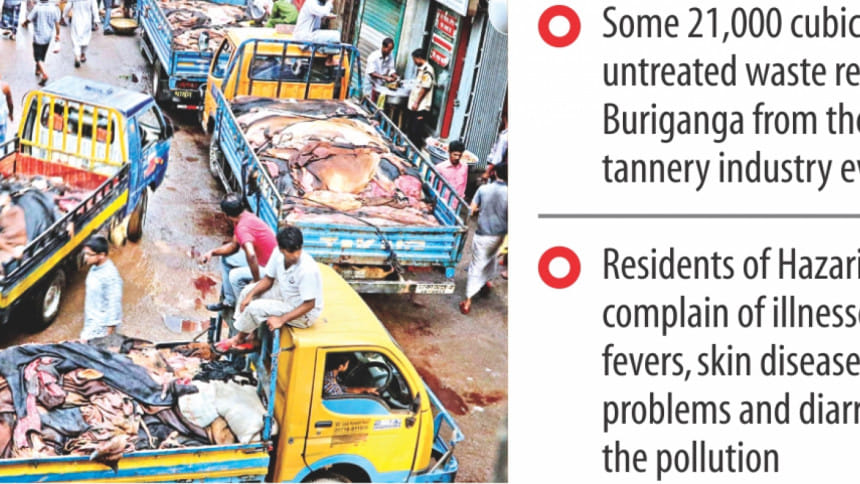Hazaribagh reels from pollution

For yet another year, the city's leather industry hub in Hazaribagh continues to face serious environmental pollution and health hazards for the people living in and around the area, thanks to the delay in relocating the tanneries to Savar.
The government has been pushing for a quick relocation, but it would take at least six more months to complete the process, industry insiders said.
Visiting Hazaribagh area on the Eid day and the subsequent days, it was found that almost all the tanners collecting and storing raw hides at their factories, suggesting they are making preparation to process those over the next few months.
The air in Hazaribagh and its adjacent areas was so thick with foul smell of blood and hides that it is difficult to breathe, especially for those not habituated with the stink. Liquid waste mixed with toxic chemicals was flowing through the drainage connected with the Buriganga.
According to government estimates, some 21,000 cubic meters of untreated effluent is released in the Buriganga from the Hazaribagh leather industry every day.
Apart from the hides, traders have also been piling bones, heads, horns and hoofs of the sacrificial animals as these parts are used for different purposes as well.
Tannery industry causes multiple health hazards for workers and the people living around it.
New York-based Human Rights Watch published a report on the Hazaribagh situation in 2012, saying, “Residents of Hazaribagh slums complain of illnesses such as fevers, skin diseases, respiratory problems, and diarrhoea caused by extreme tannery pollution in the air, water and soil.”
This year, the rawhides are coming mainly from Posta, Mirpur, Mohammadpur and Sayedabad, said Raja Mia Bepari, a trader, on Thursday.
Tanners have stored around five lakh pieces of rawhides in Hazaribagh, he added.
"Hides from outside of Dhaka are yet to arrive. They usually start coming 10 days after the Eid,” said Raja, who exports processed leather to different far eastern countries.
Tanners are now collecting hides from in and around the capital. Some traders have stored rawhides in Savar, but most of them are being stored in Hazaribagh, said Delwar Hossain, president of Raw Hides and Skins Merchants Association.
"I think nearly one lakh raw hides have been stored in Savar and the rest in Hazaribagh," he said.
According to him, traders collected at least 75 percent of the rawhides in Hazaribagh and the rest in Savar.
As a huge number of animals are sacrificed during Eid-ul-Azha, tanners collect almost half of the total rawhides during this time of the year.
Asked about the relocation, Tanners Association President Shaheen Ahmed said, "I think we need at least six months to relocate all the tanneries from Hazaribagh to Savar. Already, six tanneries have started production in Savar leather town and another 30 have completed setting up equipment there.”
Currently, 95 factories are in operation in Hazaribagh while 65 others have stopped operation there, he added.
Contacted, Industries Minister Amir Hossain Amu said the relocation would not take six months. "They will be relocated much earlier, Inshalallah [God willing]."
He said he would take steps for quick relocation once government offices opened tomorrow.
After the tanners have failed to relocate within repeated deadlines and sought time again and again, the Supreme Court has ordered the Hazaribagh tanners to pay a daily fine of Tk 10,000 for damaging the environment until they relocate to Savar.
Between August 11 and 16, tanners have deposited Tk 55.9 lakh with the national exchequer in compensation for polluting the environment.
Owners of 98 out of the 154 tanneries deposited the money in line with the SC order, according to a report submitted by the industries secretary to the apex court on August 22.
SITUATION IN SAVAR
During a visit to Savar leather industry just days before the Eid, it was seen about 100 owners somewhat completed construction of their factory buildings. Construction of the rest of the 154 buildings was underway.
The construction work of the second unit of the Central Effluent Treatment Plant (CETP) was going on in full swing.
"We were ready for the test operation of the CETP," said Project Director Abdul Qaiyum.
“Already, 47 tanners have set up wooden drums to process rawhide. We need at least 48 units to conduct the test run.”
Qaiyum said the water treatment plant in the area got power supply on June 30 and that they were ready to provide water connections to the factories.
Already, 50 industries have applied for the water connection. Also, 40 industry owners have applied for electricity supply, and 20 of them got it, he said.
(Aklakur Rahman, a correspondent from Savar, contributed to this story.)

 For all latest news, follow The Daily Star's Google News channel.
For all latest news, follow The Daily Star's Google News channel. 



Comments